Entrepreneurship and Small Business Management Report - Semester 1, UK
VerifiedAdded on 2020/07/23
|15
|5086
|32
Report
AI Summary
This report provides a comprehensive overview of entrepreneurship and small business management, examining various aspects such as entrepreneurship typologies, including lifestyle, small, large, and scalable business ventures. It differentiates between serial entrepreneurs and intrapreneurs, highlighting their roles and risk profiles. The report explores sources for generating business ideas, emphasizing family, friends, and personal interests. It assesses the impact of micro and small businesses on the UK economy using statistical data on business numbers, turnover, and employment rates. The importance of small firms in economic development is discussed, along with key factors associated with successful entrepreneurs, including traits, skills, and mindset. Furthermore, the report addresses how different environments can foster or hinder entrepreneurship, providing a well-rounded understanding of the subject.

Entrepreneurship and Small
Business Management
Business Management
Paraphrase This Document
Need a fresh take? Get an instant paraphrase of this document with our AI Paraphraser
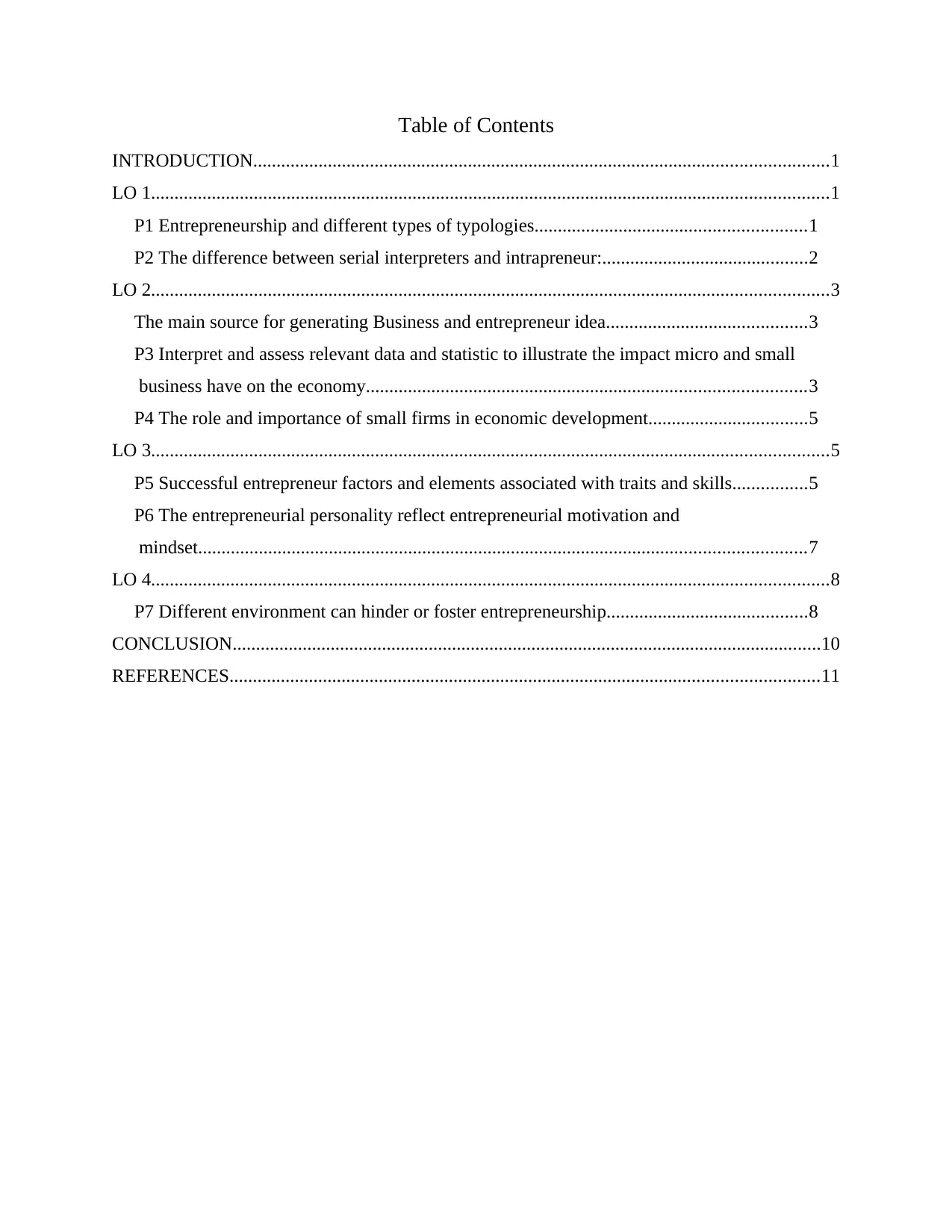
Table of Contents
INTRODUCTION...........................................................................................................................1
LO 1.................................................................................................................................................1
P1 Entrepreneurship and different types of typologies..........................................................1
P2 The difference between serial interpreters and intrapreneur:............................................2
LO 2.................................................................................................................................................3
The main source for generating Business and entrepreneur idea...........................................3
P3 Interpret and assess relevant data and statistic to illustrate the impact micro and small
business have on the economy..............................................................................................3
P4 The role and importance of small firms in economic development..................................5
LO 3.................................................................................................................................................5
P5 Successful entrepreneur factors and elements associated with traits and skills................5
P6 The entrepreneurial personality reflect entrepreneurial motivation and
mindset..................................................................................................................................7
LO 4.................................................................................................................................................8
P7 Different environment can hinder or foster entrepreneurship...........................................8
CONCLUSION..............................................................................................................................10
REFERENCES..............................................................................................................................11
INTRODUCTION...........................................................................................................................1
LO 1.................................................................................................................................................1
P1 Entrepreneurship and different types of typologies..........................................................1
P2 The difference between serial interpreters and intrapreneur:............................................2
LO 2.................................................................................................................................................3
The main source for generating Business and entrepreneur idea...........................................3
P3 Interpret and assess relevant data and statistic to illustrate the impact micro and small
business have on the economy..............................................................................................3
P4 The role and importance of small firms in economic development..................................5
LO 3.................................................................................................................................................5
P5 Successful entrepreneur factors and elements associated with traits and skills................5
P6 The entrepreneurial personality reflect entrepreneurial motivation and
mindset..................................................................................................................................7
LO 4.................................................................................................................................................8
P7 Different environment can hinder or foster entrepreneurship...........................................8
CONCLUSION..............................................................................................................................10
REFERENCES..............................................................................................................................11
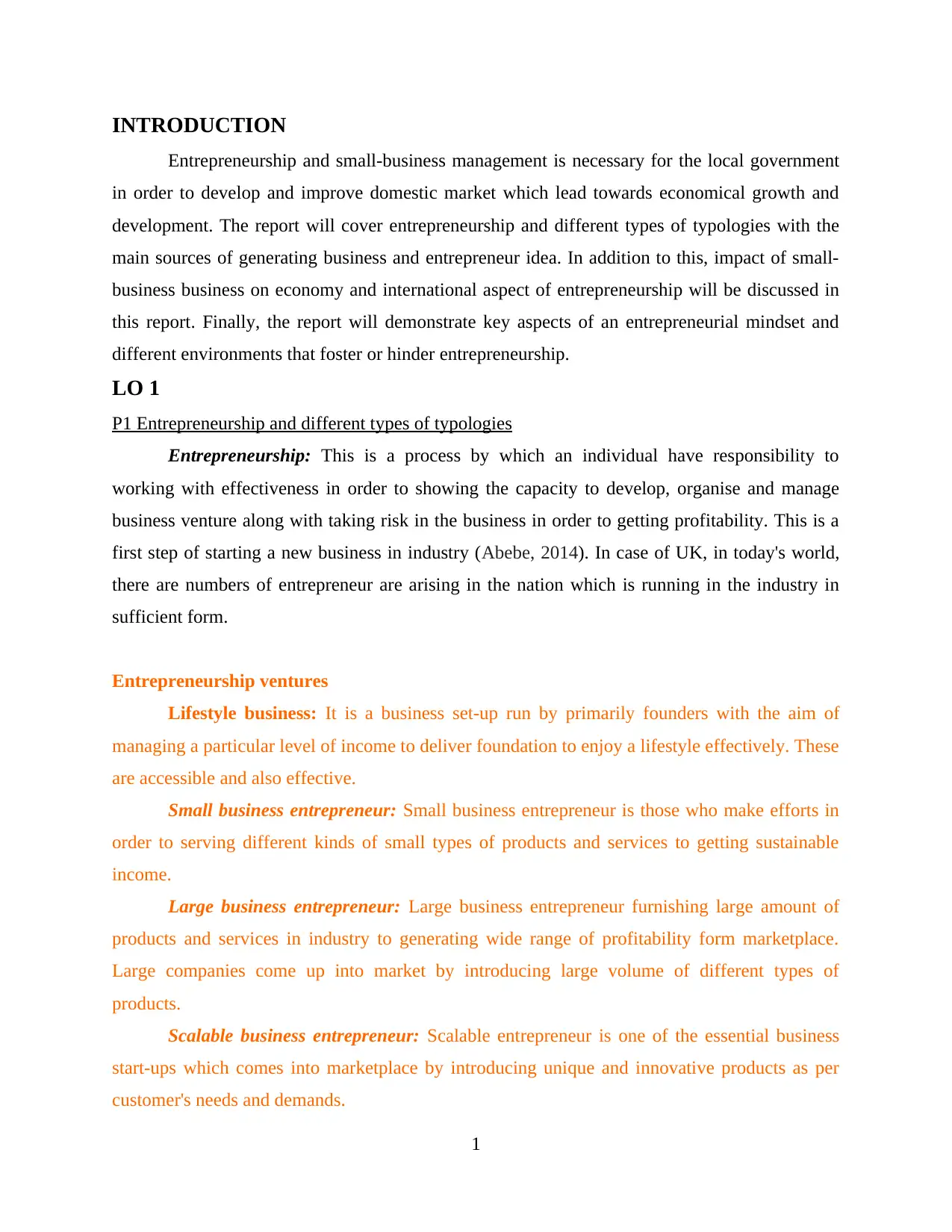
INTRODUCTION
Entrepreneurship and small-business management is necessary for the local government
in order to develop and improve domestic market which lead towards economical growth and
development. The report will cover entrepreneurship and different types of typologies with the
main sources of generating business and entrepreneur idea. In addition to this, impact of small-
business business on economy and international aspect of entrepreneurship will be discussed in
this report. Finally, the report will demonstrate key aspects of an entrepreneurial mindset and
different environments that foster or hinder entrepreneurship.
LO 1
P1 Entrepreneurship and different types of typologies
Entrepreneurship: This is a process by which an individual have responsibility to
working with effectiveness in order to showing the capacity to develop, organise and manage
business venture along with taking risk in the business in order to getting profitability. This is a
first step of starting a new business in industry (Abebe, 2014). In case of UK, in today's world,
there are numbers of entrepreneur are arising in the nation which is running in the industry in
sufficient form.
Entrepreneurship ventures
Lifestyle business: It is a business set-up run by primarily founders with the aim of
managing a particular level of income to deliver foundation to enjoy a lifestyle effectively. These
are accessible and also effective.
Small business entrepreneur: Small business entrepreneur is those who make efforts in
order to serving different kinds of small types of products and services to getting sustainable
income.
Large business entrepreneur: Large business entrepreneur furnishing large amount of
products and services in industry to generating wide range of profitability form marketplace.
Large companies come up into market by introducing large volume of different types of
products.
Scalable business entrepreneur: Scalable entrepreneur is one of the essential business
start-ups which comes into marketplace by introducing unique and innovative products as per
customer's needs and demands.
1
Entrepreneurship and small-business management is necessary for the local government
in order to develop and improve domestic market which lead towards economical growth and
development. The report will cover entrepreneurship and different types of typologies with the
main sources of generating business and entrepreneur idea. In addition to this, impact of small-
business business on economy and international aspect of entrepreneurship will be discussed in
this report. Finally, the report will demonstrate key aspects of an entrepreneurial mindset and
different environments that foster or hinder entrepreneurship.
LO 1
P1 Entrepreneurship and different types of typologies
Entrepreneurship: This is a process by which an individual have responsibility to
working with effectiveness in order to showing the capacity to develop, organise and manage
business venture along with taking risk in the business in order to getting profitability. This is a
first step of starting a new business in industry (Abebe, 2014). In case of UK, in today's world,
there are numbers of entrepreneur are arising in the nation which is running in the industry in
sufficient form.
Entrepreneurship ventures
Lifestyle business: It is a business set-up run by primarily founders with the aim of
managing a particular level of income to deliver foundation to enjoy a lifestyle effectively. These
are accessible and also effective.
Small business entrepreneur: Small business entrepreneur is those who make efforts in
order to serving different kinds of small types of products and services to getting sustainable
income.
Large business entrepreneur: Large business entrepreneur furnishing large amount of
products and services in industry to generating wide range of profitability form marketplace.
Large companies come up into market by introducing large volume of different types of
products.
Scalable business entrepreneur: Scalable entrepreneur is one of the essential business
start-ups which comes into marketplace by introducing unique and innovative products as per
customer's needs and demands.
1
⊘ This is a preview!⊘
Do you want full access?
Subscribe today to unlock all pages.

Trusted by 1+ million students worldwide
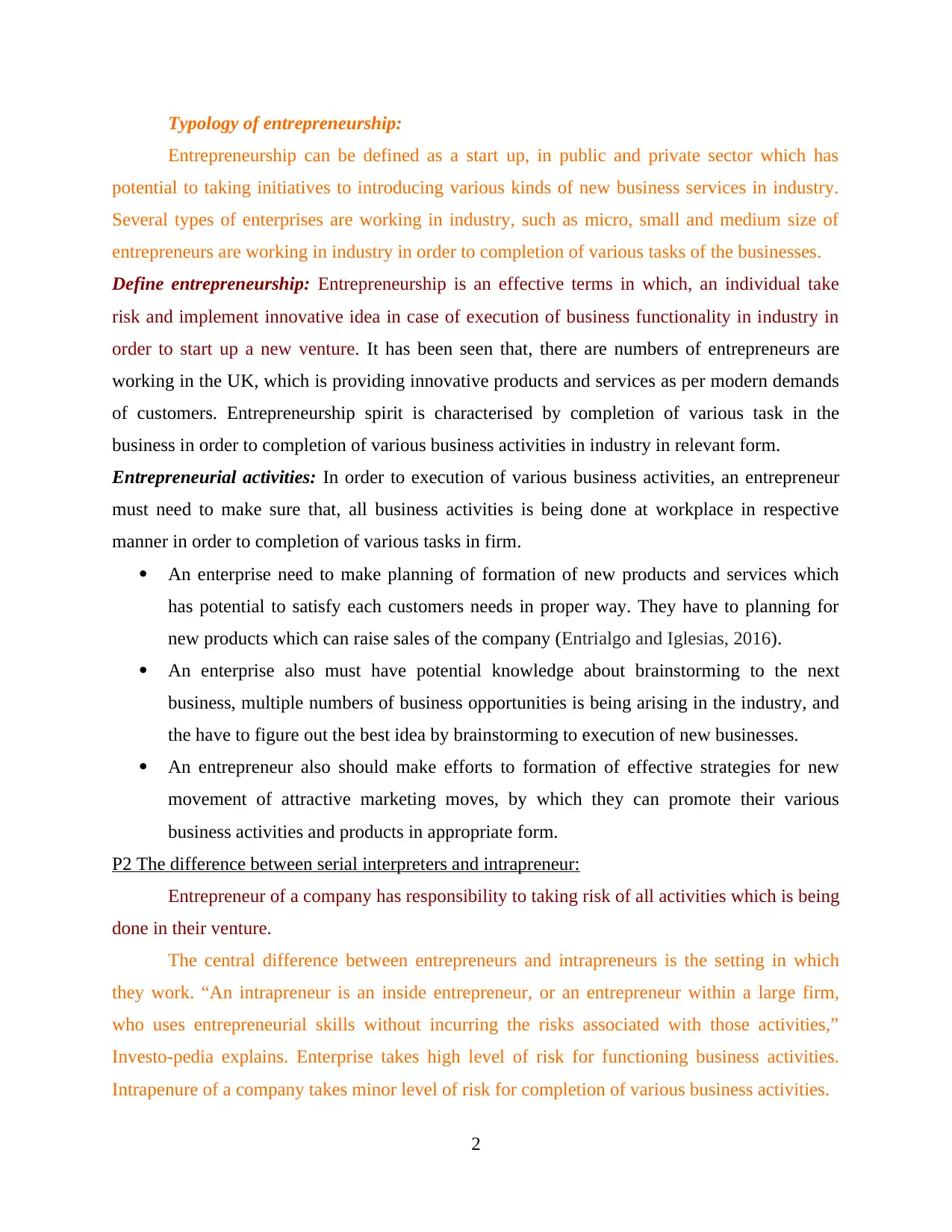
Typology of entrepreneurship:
Entrepreneurship can be defined as a start up, in public and private sector which has
potential to taking initiatives to introducing various kinds of new business services in industry.
Several types of enterprises are working in industry, such as micro, small and medium size of
entrepreneurs are working in industry in order to completion of various tasks of the businesses.
Define entrepreneurship: Entrepreneurship is an effective terms in which, an individual take
risk and implement innovative idea in case of execution of business functionality in industry in
order to start up a new venture. It has been seen that, there are numbers of entrepreneurs are
working in the UK, which is providing innovative products and services as per modern demands
of customers. Entrepreneurship spirit is characterised by completion of various task in the
business in order to completion of various business activities in industry in relevant form.
Entrepreneurial activities: In order to execution of various business activities, an entrepreneur
must need to make sure that, all business activities is being done at workplace in respective
manner in order to completion of various tasks in firm.
An enterprise need to make planning of formation of new products and services which
has potential to satisfy each customers needs in proper way. They have to planning for
new products which can raise sales of the company (Entrialgo and Iglesias, 2016).
An enterprise also must have potential knowledge about brainstorming to the next
business, multiple numbers of business opportunities is being arising in the industry, and
the have to figure out the best idea by brainstorming to execution of new businesses.
An entrepreneur also should make efforts to formation of effective strategies for new
movement of attractive marketing moves, by which they can promote their various
business activities and products in appropriate form.
P2 The difference between serial interpreters and intrapreneur:
Entrepreneur of a company has responsibility to taking risk of all activities which is being
done in their venture.
The central difference between entrepreneurs and intrapreneurs is the setting in which
they work. “An intrapreneur is an inside entrepreneur, or an entrepreneur within a large firm,
who uses entrepreneurial skills without incurring the risks associated with those activities,”
Investo-pedia explains. Enterprise takes high level of risk for functioning business activities.
Intrapenure of a company takes minor level of risk for completion of various business activities.
2
Entrepreneurship can be defined as a start up, in public and private sector which has
potential to taking initiatives to introducing various kinds of new business services in industry.
Several types of enterprises are working in industry, such as micro, small and medium size of
entrepreneurs are working in industry in order to completion of various tasks of the businesses.
Define entrepreneurship: Entrepreneurship is an effective terms in which, an individual take
risk and implement innovative idea in case of execution of business functionality in industry in
order to start up a new venture. It has been seen that, there are numbers of entrepreneurs are
working in the UK, which is providing innovative products and services as per modern demands
of customers. Entrepreneurship spirit is characterised by completion of various task in the
business in order to completion of various business activities in industry in relevant form.
Entrepreneurial activities: In order to execution of various business activities, an entrepreneur
must need to make sure that, all business activities is being done at workplace in respective
manner in order to completion of various tasks in firm.
An enterprise need to make planning of formation of new products and services which
has potential to satisfy each customers needs in proper way. They have to planning for
new products which can raise sales of the company (Entrialgo and Iglesias, 2016).
An enterprise also must have potential knowledge about brainstorming to the next
business, multiple numbers of business opportunities is being arising in the industry, and
the have to figure out the best idea by brainstorming to execution of new businesses.
An entrepreneur also should make efforts to formation of effective strategies for new
movement of attractive marketing moves, by which they can promote their various
business activities and products in appropriate form.
P2 The difference between serial interpreters and intrapreneur:
Entrepreneur of a company has responsibility to taking risk of all activities which is being
done in their venture.
The central difference between entrepreneurs and intrapreneurs is the setting in which
they work. “An intrapreneur is an inside entrepreneur, or an entrepreneur within a large firm,
who uses entrepreneurial skills without incurring the risks associated with those activities,”
Investo-pedia explains. Enterprise takes high level of risk for functioning business activities.
Intrapenure of a company takes minor level of risk for completion of various business activities.
2
Paraphrase This Document
Need a fresh take? Get an instant paraphrase of this document with our AI Paraphraser
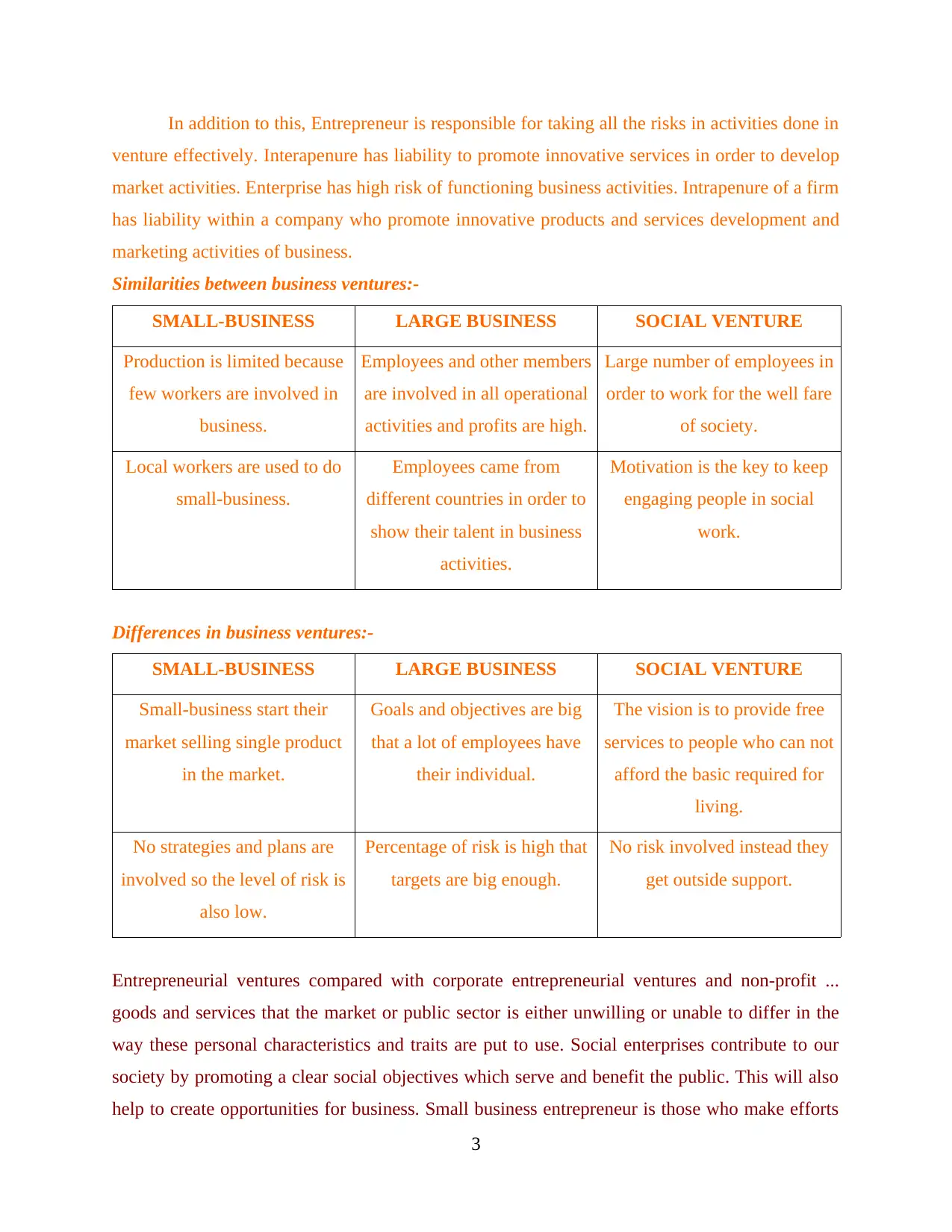
In addition to this, Entrepreneur is responsible for taking all the risks in activities done in
venture effectively. Interapenure has liability to promote innovative services in order to develop
market activities. Enterprise has high risk of functioning business activities. Intrapenure of a firm
has liability within a company who promote innovative products and services development and
marketing activities of business.
Similarities between business ventures:-
SMALL-BUSINESS LARGE BUSINESS SOCIAL VENTURE
Production is limited because
few workers are involved in
business.
Employees and other members
are involved in all operational
activities and profits are high.
Large number of employees in
order to work for the well fare
of society.
Local workers are used to do
small-business.
Employees came from
different countries in order to
show their talent in business
activities.
Motivation is the key to keep
engaging people in social
work.
Differences in business ventures:-
SMALL-BUSINESS LARGE BUSINESS SOCIAL VENTURE
Small-business start their
market selling single product
in the market.
Goals and objectives are big
that a lot of employees have
their individual.
The vision is to provide free
services to people who can not
afford the basic required for
living.
No strategies and plans are
involved so the level of risk is
also low.
Percentage of risk is high that
targets are big enough.
No risk involved instead they
get outside support.
Entrepreneurial ventures compared with corporate entrepreneurial ventures and non-profit ...
goods and services that the market or public sector is either unwilling or unable to differ in the
way these personal characteristics and traits are put to use. Social enterprises contribute to our
society by promoting a clear social objectives which serve and benefit the public. This will also
help to create opportunities for business. Small business entrepreneur is those who make efforts
3
venture effectively. Interapenure has liability to promote innovative services in order to develop
market activities. Enterprise has high risk of functioning business activities. Intrapenure of a firm
has liability within a company who promote innovative products and services development and
marketing activities of business.
Similarities between business ventures:-
SMALL-BUSINESS LARGE BUSINESS SOCIAL VENTURE
Production is limited because
few workers are involved in
business.
Employees and other members
are involved in all operational
activities and profits are high.
Large number of employees in
order to work for the well fare
of society.
Local workers are used to do
small-business.
Employees came from
different countries in order to
show their talent in business
activities.
Motivation is the key to keep
engaging people in social
work.
Differences in business ventures:-
SMALL-BUSINESS LARGE BUSINESS SOCIAL VENTURE
Small-business start their
market selling single product
in the market.
Goals and objectives are big
that a lot of employees have
their individual.
The vision is to provide free
services to people who can not
afford the basic required for
living.
No strategies and plans are
involved so the level of risk is
also low.
Percentage of risk is high that
targets are big enough.
No risk involved instead they
get outside support.
Entrepreneurial ventures compared with corporate entrepreneurial ventures and non-profit ...
goods and services that the market or public sector is either unwilling or unable to differ in the
way these personal characteristics and traits are put to use. Social enterprises contribute to our
society by promoting a clear social objectives which serve and benefit the public. This will also
help to create opportunities for business. Small business entrepreneur is those who make efforts
3
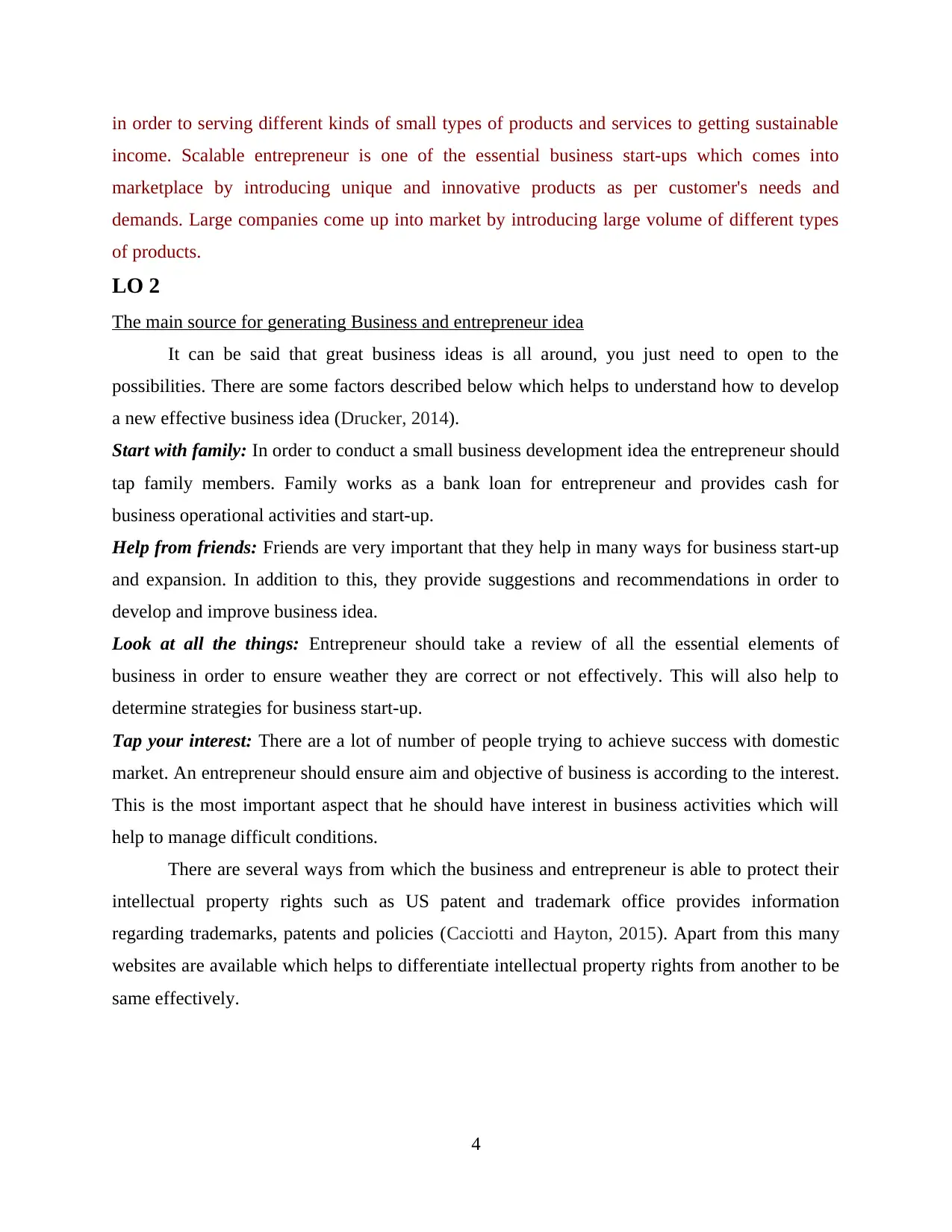
in order to serving different kinds of small types of products and services to getting sustainable
income. Scalable entrepreneur is one of the essential business start-ups which comes into
marketplace by introducing unique and innovative products as per customer's needs and
demands. Large companies come up into market by introducing large volume of different types
of products.
LO 2
The main source for generating Business and entrepreneur idea
It can be said that great business ideas is all around, you just need to open to the
possibilities. There are some factors described below which helps to understand how to develop
a new effective business idea (Drucker, 2014).
Start with family: In order to conduct a small business development idea the entrepreneur should
tap family members. Family works as a bank loan for entrepreneur and provides cash for
business operational activities and start-up.
Help from friends: Friends are very important that they help in many ways for business start-up
and expansion. In addition to this, they provide suggestions and recommendations in order to
develop and improve business idea.
Look at all the things: Entrepreneur should take a review of all the essential elements of
business in order to ensure weather they are correct or not effectively. This will also help to
determine strategies for business start-up.
Tap your interest: There are a lot of number of people trying to achieve success with domestic
market. An entrepreneur should ensure aim and objective of business is according to the interest.
This is the most important aspect that he should have interest in business activities which will
help to manage difficult conditions.
There are several ways from which the business and entrepreneur is able to protect their
intellectual property rights such as US patent and trademark office provides information
regarding trademarks, patents and policies (Cacciotti and Hayton, 2015). Apart from this many
websites are available which helps to differentiate intellectual property rights from another to be
same effectively.
4
income. Scalable entrepreneur is one of the essential business start-ups which comes into
marketplace by introducing unique and innovative products as per customer's needs and
demands. Large companies come up into market by introducing large volume of different types
of products.
LO 2
The main source for generating Business and entrepreneur idea
It can be said that great business ideas is all around, you just need to open to the
possibilities. There are some factors described below which helps to understand how to develop
a new effective business idea (Drucker, 2014).
Start with family: In order to conduct a small business development idea the entrepreneur should
tap family members. Family works as a bank loan for entrepreneur and provides cash for
business operational activities and start-up.
Help from friends: Friends are very important that they help in many ways for business start-up
and expansion. In addition to this, they provide suggestions and recommendations in order to
develop and improve business idea.
Look at all the things: Entrepreneur should take a review of all the essential elements of
business in order to ensure weather they are correct or not effectively. This will also help to
determine strategies for business start-up.
Tap your interest: There are a lot of number of people trying to achieve success with domestic
market. An entrepreneur should ensure aim and objective of business is according to the interest.
This is the most important aspect that he should have interest in business activities which will
help to manage difficult conditions.
There are several ways from which the business and entrepreneur is able to protect their
intellectual property rights such as US patent and trademark office provides information
regarding trademarks, patents and policies (Cacciotti and Hayton, 2015). Apart from this many
websites are available which helps to differentiate intellectual property rights from another to be
same effectively.
4
⊘ This is a preview!⊘
Do you want full access?
Subscribe today to unlock all pages.

Trusted by 1+ million students worldwide
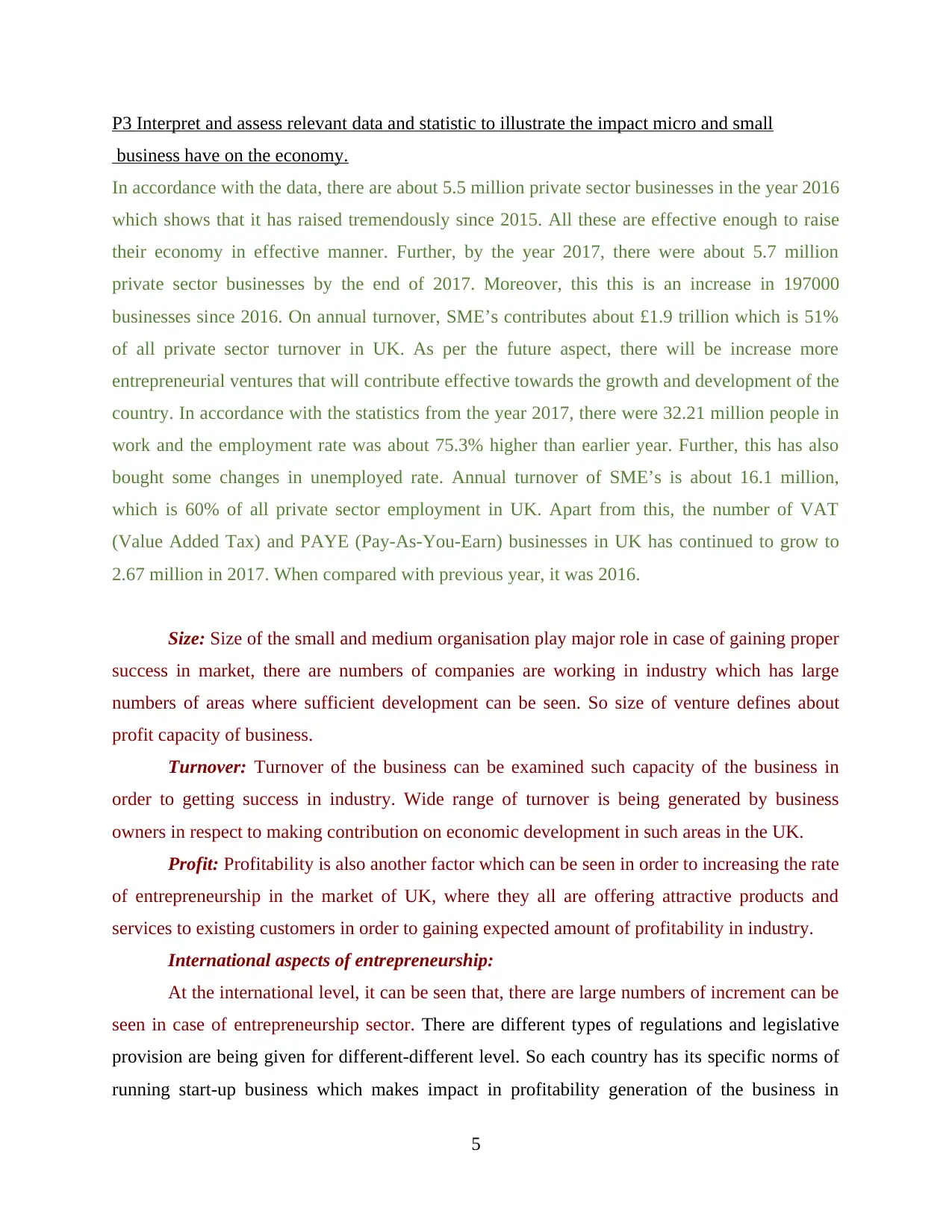
P3 Interpret and assess relevant data and statistic to illustrate the impact micro and small
business have on the economy.
In accordance with the data, there are about 5.5 million private sector businesses in the year 2016
which shows that it has raised tremendously since 2015. All these are effective enough to raise
their economy in effective manner. Further, by the year 2017, there were about 5.7 million
private sector businesses by the end of 2017. Moreover, this this is an increase in 197000
businesses since 2016. On annual turnover, SME’s contributes about £1.9 trillion which is 51%
of all private sector turnover in UK. As per the future aspect, there will be increase more
entrepreneurial ventures that will contribute effective towards the growth and development of the
country. In accordance with the statistics from the year 2017, there were 32.21 million people in
work and the employment rate was about 75.3% higher than earlier year. Further, this has also
bought some changes in unemployed rate. Annual turnover of SME’s is about 16.1 million,
which is 60% of all private sector employment in UK. Apart from this, the number of VAT
(Value Added Tax) and PAYE (Pay-As-You-Earn) businesses in UK has continued to grow to
2.67 million in 2017. When compared with previous year, it was 2016.
Size: Size of the small and medium organisation play major role in case of gaining proper
success in market, there are numbers of companies are working in industry which has large
numbers of areas where sufficient development can be seen. So size of venture defines about
profit capacity of business.
Turnover: Turnover of the business can be examined such capacity of the business in
order to getting success in industry. Wide range of turnover is being generated by business
owners in respect to making contribution on economic development in such areas in the UK.
Profit: Profitability is also another factor which can be seen in order to increasing the rate
of entrepreneurship in the market of UK, where they all are offering attractive products and
services to existing customers in order to gaining expected amount of profitability in industry.
International aspects of entrepreneurship:
At the international level, it can be seen that, there are large numbers of increment can be
seen in case of entrepreneurship sector. There are different types of regulations and legislative
provision are being given for different-different level. So each country has its specific norms of
running start-up business which makes impact in profitability generation of the business in
5
business have on the economy.
In accordance with the data, there are about 5.5 million private sector businesses in the year 2016
which shows that it has raised tremendously since 2015. All these are effective enough to raise
their economy in effective manner. Further, by the year 2017, there were about 5.7 million
private sector businesses by the end of 2017. Moreover, this this is an increase in 197000
businesses since 2016. On annual turnover, SME’s contributes about £1.9 trillion which is 51%
of all private sector turnover in UK. As per the future aspect, there will be increase more
entrepreneurial ventures that will contribute effective towards the growth and development of the
country. In accordance with the statistics from the year 2017, there were 32.21 million people in
work and the employment rate was about 75.3% higher than earlier year. Further, this has also
bought some changes in unemployed rate. Annual turnover of SME’s is about 16.1 million,
which is 60% of all private sector employment in UK. Apart from this, the number of VAT
(Value Added Tax) and PAYE (Pay-As-You-Earn) businesses in UK has continued to grow to
2.67 million in 2017. When compared with previous year, it was 2016.
Size: Size of the small and medium organisation play major role in case of gaining proper
success in market, there are numbers of companies are working in industry which has large
numbers of areas where sufficient development can be seen. So size of venture defines about
profit capacity of business.
Turnover: Turnover of the business can be examined such capacity of the business in
order to getting success in industry. Wide range of turnover is being generated by business
owners in respect to making contribution on economic development in such areas in the UK.
Profit: Profitability is also another factor which can be seen in order to increasing the rate
of entrepreneurship in the market of UK, where they all are offering attractive products and
services to existing customers in order to gaining expected amount of profitability in industry.
International aspects of entrepreneurship:
At the international level, it can be seen that, there are large numbers of increment can be
seen in case of entrepreneurship sector. There are different types of regulations and legislative
provision are being given for different-different level. So each country has its specific norms of
running start-up business which makes impact in profitability generation of the business in
5
Paraphrase This Document
Need a fresh take? Get an instant paraphrase of this document with our AI Paraphraser
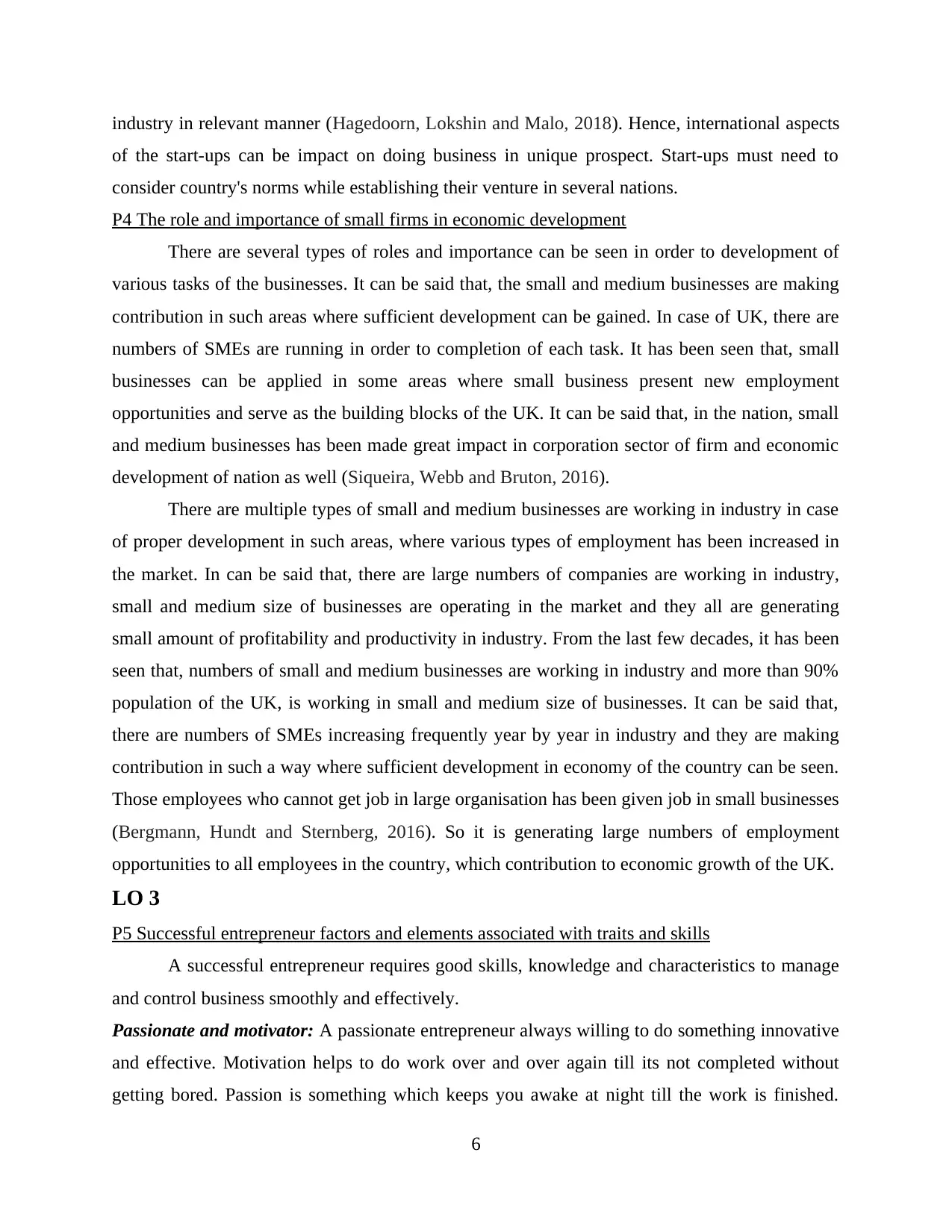
industry in relevant manner (Hagedoorn, Lokshin and Malo, 2018). Hence, international aspects
of the start-ups can be impact on doing business in unique prospect. Start-ups must need to
consider country's norms while establishing their venture in several nations.
P4 The role and importance of small firms in economic development
There are several types of roles and importance can be seen in order to development of
various tasks of the businesses. It can be said that, the small and medium businesses are making
contribution in such areas where sufficient development can be gained. In case of UK, there are
numbers of SMEs are running in order to completion of each task. It has been seen that, small
businesses can be applied in some areas where small business present new employment
opportunities and serve as the building blocks of the UK. It can be said that, in the nation, small
and medium businesses has been made great impact in corporation sector of firm and economic
development of nation as well (Siqueira, Webb and Bruton, 2016).
There are multiple types of small and medium businesses are working in industry in case
of proper development in such areas, where various types of employment has been increased in
the market. In can be said that, there are large numbers of companies are working in industry,
small and medium size of businesses are operating in the market and they all are generating
small amount of profitability and productivity in industry. From the last few decades, it has been
seen that, numbers of small and medium businesses are working in industry and more than 90%
population of the UK, is working in small and medium size of businesses. It can be said that,
there are numbers of SMEs increasing frequently year by year in industry and they are making
contribution in such a way where sufficient development in economy of the country can be seen.
Those employees who cannot get job in large organisation has been given job in small businesses
(Bergmann, Hundt and Sternberg, 2016). So it is generating large numbers of employment
opportunities to all employees in the country, which contribution to economic growth of the UK.
LO 3
P5 Successful entrepreneur factors and elements associated with traits and skills
A successful entrepreneur requires good skills, knowledge and characteristics to manage
and control business smoothly and effectively.
Passionate and motivator: A passionate entrepreneur always willing to do something innovative
and effective. Motivation helps to do work over and over again till its not completed without
getting bored. Passion is something which keeps you awake at night till the work is finished.
6
of the start-ups can be impact on doing business in unique prospect. Start-ups must need to
consider country's norms while establishing their venture in several nations.
P4 The role and importance of small firms in economic development
There are several types of roles and importance can be seen in order to development of
various tasks of the businesses. It can be said that, the small and medium businesses are making
contribution in such areas where sufficient development can be gained. In case of UK, there are
numbers of SMEs are running in order to completion of each task. It has been seen that, small
businesses can be applied in some areas where small business present new employment
opportunities and serve as the building blocks of the UK. It can be said that, in the nation, small
and medium businesses has been made great impact in corporation sector of firm and economic
development of nation as well (Siqueira, Webb and Bruton, 2016).
There are multiple types of small and medium businesses are working in industry in case
of proper development in such areas, where various types of employment has been increased in
the market. In can be said that, there are large numbers of companies are working in industry,
small and medium size of businesses are operating in the market and they all are generating
small amount of profitability and productivity in industry. From the last few decades, it has been
seen that, numbers of small and medium businesses are working in industry and more than 90%
population of the UK, is working in small and medium size of businesses. It can be said that,
there are numbers of SMEs increasing frequently year by year in industry and they are making
contribution in such a way where sufficient development in economy of the country can be seen.
Those employees who cannot get job in large organisation has been given job in small businesses
(Bergmann, Hundt and Sternberg, 2016). So it is generating large numbers of employment
opportunities to all employees in the country, which contribution to economic growth of the UK.
LO 3
P5 Successful entrepreneur factors and elements associated with traits and skills
A successful entrepreneur requires good skills, knowledge and characteristics to manage
and control business smoothly and effectively.
Passionate and motivator: A passionate entrepreneur always willing to do something innovative
and effective. Motivation helps to do work over and over again till its not completed without
getting bored. Passion is something which keeps you awake at night till the work is finished.
6
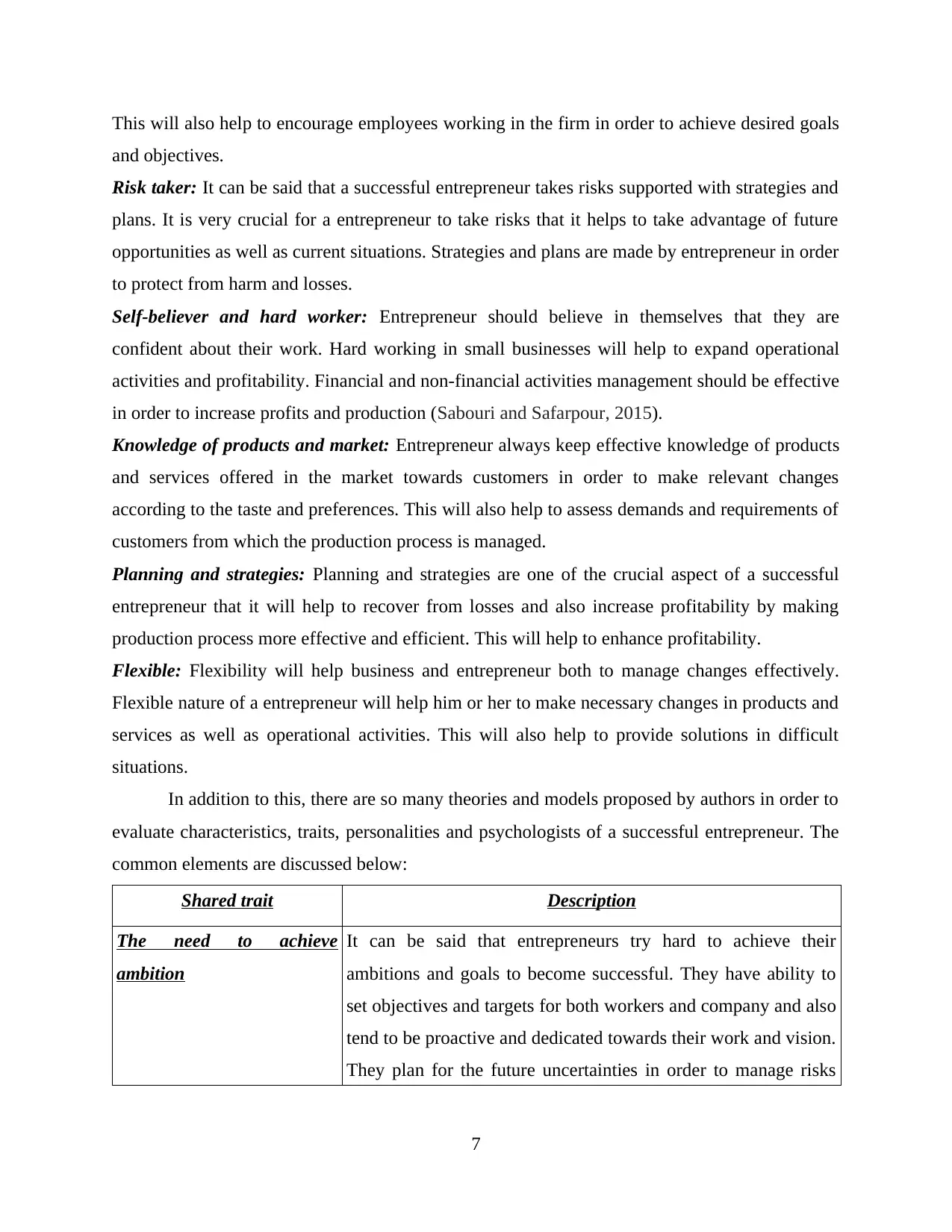
This will also help to encourage employees working in the firm in order to achieve desired goals
and objectives.
Risk taker: It can be said that a successful entrepreneur takes risks supported with strategies and
plans. It is very crucial for a entrepreneur to take risks that it helps to take advantage of future
opportunities as well as current situations. Strategies and plans are made by entrepreneur in order
to protect from harm and losses.
Self-believer and hard worker: Entrepreneur should believe in themselves that they are
confident about their work. Hard working in small businesses will help to expand operational
activities and profitability. Financial and non-financial activities management should be effective
in order to increase profits and production (Sabouri and Safarpour, 2015).
Knowledge of products and market: Entrepreneur always keep effective knowledge of products
and services offered in the market towards customers in order to make relevant changes
according to the taste and preferences. This will also help to assess demands and requirements of
customers from which the production process is managed.
Planning and strategies: Planning and strategies are one of the crucial aspect of a successful
entrepreneur that it will help to recover from losses and also increase profitability by making
production process more effective and efficient. This will help to enhance profitability.
Flexible: Flexibility will help business and entrepreneur both to manage changes effectively.
Flexible nature of a entrepreneur will help him or her to make necessary changes in products and
services as well as operational activities. This will also help to provide solutions in difficult
situations.
In addition to this, there are so many theories and models proposed by authors in order to
evaluate characteristics, traits, personalities and psychologists of a successful entrepreneur. The
common elements are discussed below:
Shared trait Description
The need to achieve
ambition
It can be said that entrepreneurs try hard to achieve their
ambitions and goals to become successful. They have ability to
set objectives and targets for both workers and company and also
tend to be proactive and dedicated towards their work and vision.
They plan for the future uncertainties in order to manage risks
7
and objectives.
Risk taker: It can be said that a successful entrepreneur takes risks supported with strategies and
plans. It is very crucial for a entrepreneur to take risks that it helps to take advantage of future
opportunities as well as current situations. Strategies and plans are made by entrepreneur in order
to protect from harm and losses.
Self-believer and hard worker: Entrepreneur should believe in themselves that they are
confident about their work. Hard working in small businesses will help to expand operational
activities and profitability. Financial and non-financial activities management should be effective
in order to increase profits and production (Sabouri and Safarpour, 2015).
Knowledge of products and market: Entrepreneur always keep effective knowledge of products
and services offered in the market towards customers in order to make relevant changes
according to the taste and preferences. This will also help to assess demands and requirements of
customers from which the production process is managed.
Planning and strategies: Planning and strategies are one of the crucial aspect of a successful
entrepreneur that it will help to recover from losses and also increase profitability by making
production process more effective and efficient. This will help to enhance profitability.
Flexible: Flexibility will help business and entrepreneur both to manage changes effectively.
Flexible nature of a entrepreneur will help him or her to make necessary changes in products and
services as well as operational activities. This will also help to provide solutions in difficult
situations.
In addition to this, there are so many theories and models proposed by authors in order to
evaluate characteristics, traits, personalities and psychologists of a successful entrepreneur. The
common elements are discussed below:
Shared trait Description
The need to achieve
ambition
It can be said that entrepreneurs try hard to achieve their
ambitions and goals to become successful. They have ability to
set objectives and targets for both workers and company and also
tend to be proactive and dedicated towards their work and vision.
They plan for the future uncertainties in order to manage risks
7
⊘ This is a preview!⊘
Do you want full access?
Subscribe today to unlock all pages.

Trusted by 1+ million students worldwide
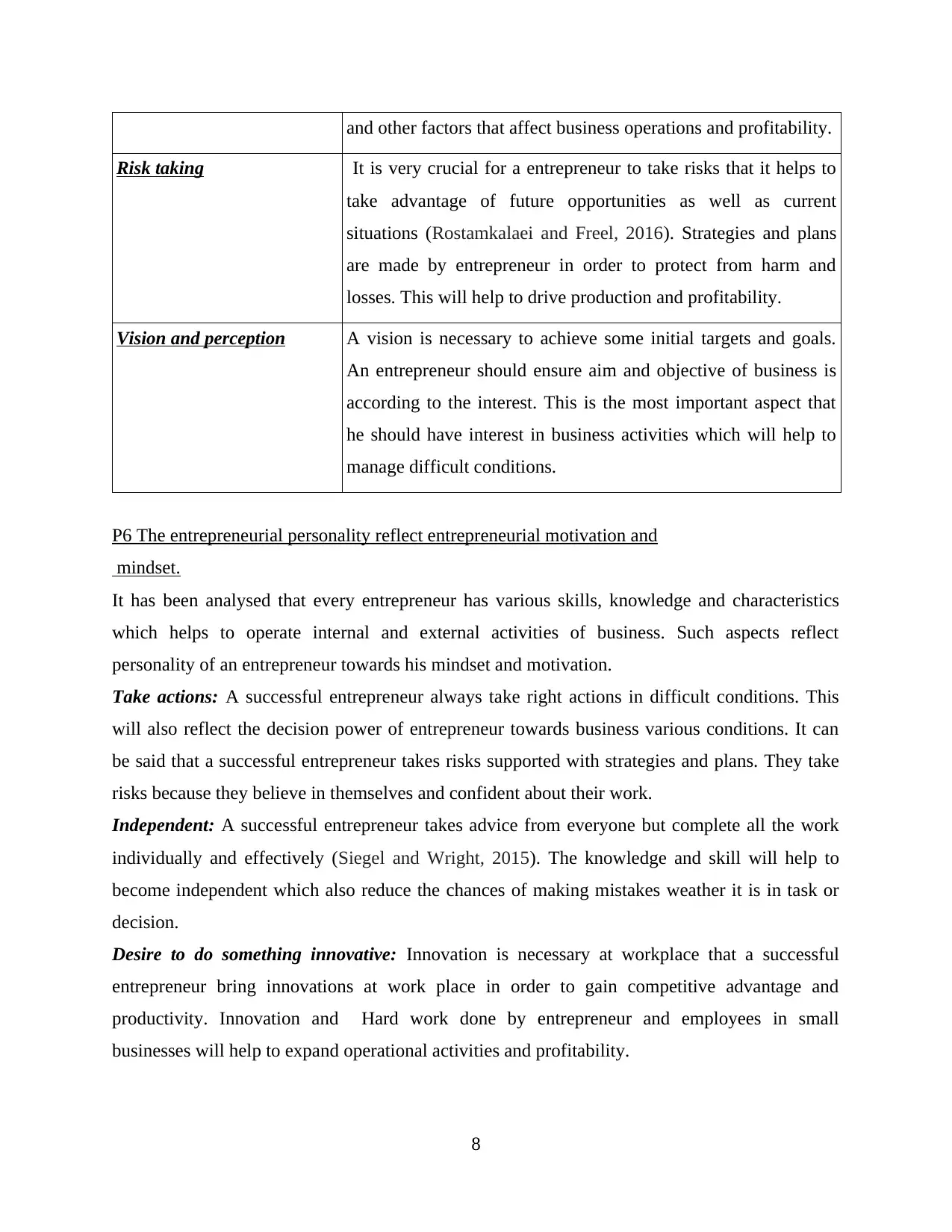
and other factors that affect business operations and profitability.
Risk taking It is very crucial for a entrepreneur to take risks that it helps to
take advantage of future opportunities as well as current
situations (Rostamkalaei and Freel, 2016). Strategies and plans
are made by entrepreneur in order to protect from harm and
losses. This will help to drive production and profitability.
Vision and perception A vision is necessary to achieve some initial targets and goals.
An entrepreneur should ensure aim and objective of business is
according to the interest. This is the most important aspect that
he should have interest in business activities which will help to
manage difficult conditions.
P6 The entrepreneurial personality reflect entrepreneurial motivation and
mindset.
It has been analysed that every entrepreneur has various skills, knowledge and characteristics
which helps to operate internal and external activities of business. Such aspects reflect
personality of an entrepreneur towards his mindset and motivation.
Take actions: A successful entrepreneur always take right actions in difficult conditions. This
will also reflect the decision power of entrepreneur towards business various conditions. It can
be said that a successful entrepreneur takes risks supported with strategies and plans. They take
risks because they believe in themselves and confident about their work.
Independent: A successful entrepreneur takes advice from everyone but complete all the work
individually and effectively (Siegel and Wright, 2015). The knowledge and skill will help to
become independent which also reduce the chances of making mistakes weather it is in task or
decision.
Desire to do something innovative: Innovation is necessary at workplace that a successful
entrepreneur bring innovations at work place in order to gain competitive advantage and
productivity. Innovation and Hard work done by entrepreneur and employees in small
businesses will help to expand operational activities and profitability.
8
Risk taking It is very crucial for a entrepreneur to take risks that it helps to
take advantage of future opportunities as well as current
situations (Rostamkalaei and Freel, 2016). Strategies and plans
are made by entrepreneur in order to protect from harm and
losses. This will help to drive production and profitability.
Vision and perception A vision is necessary to achieve some initial targets and goals.
An entrepreneur should ensure aim and objective of business is
according to the interest. This is the most important aspect that
he should have interest in business activities which will help to
manage difficult conditions.
P6 The entrepreneurial personality reflect entrepreneurial motivation and
mindset.
It has been analysed that every entrepreneur has various skills, knowledge and characteristics
which helps to operate internal and external activities of business. Such aspects reflect
personality of an entrepreneur towards his mindset and motivation.
Take actions: A successful entrepreneur always take right actions in difficult conditions. This
will also reflect the decision power of entrepreneur towards business various conditions. It can
be said that a successful entrepreneur takes risks supported with strategies and plans. They take
risks because they believe in themselves and confident about their work.
Independent: A successful entrepreneur takes advice from everyone but complete all the work
individually and effectively (Siegel and Wright, 2015). The knowledge and skill will help to
become independent which also reduce the chances of making mistakes weather it is in task or
decision.
Desire to do something innovative: Innovation is necessary at workplace that a successful
entrepreneur bring innovations at work place in order to gain competitive advantage and
productivity. Innovation and Hard work done by entrepreneur and employees in small
businesses will help to expand operational activities and profitability.
8
Paraphrase This Document
Need a fresh take? Get an instant paraphrase of this document with our AI Paraphraser
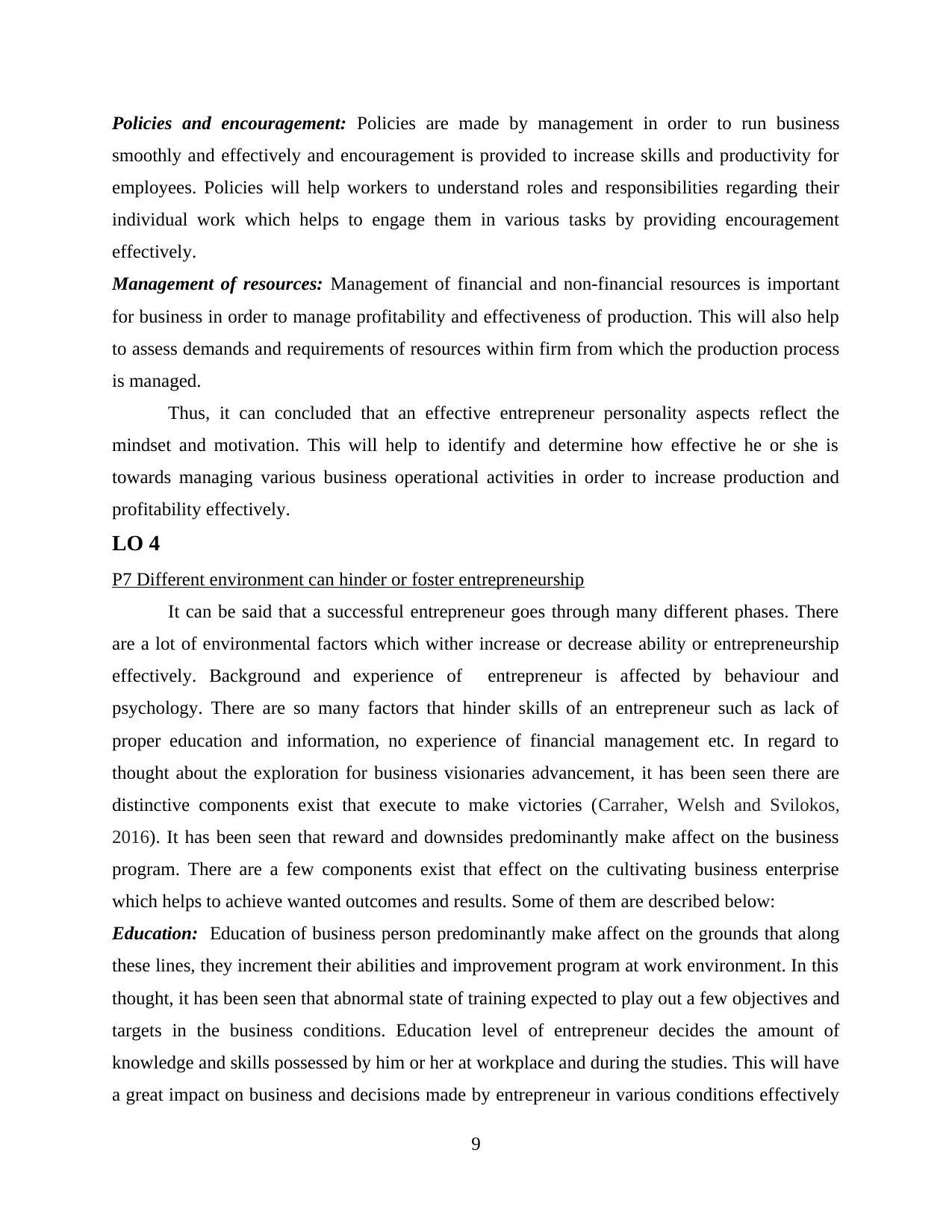
Policies and encouragement: Policies are made by management in order to run business
smoothly and effectively and encouragement is provided to increase skills and productivity for
employees. Policies will help workers to understand roles and responsibilities regarding their
individual work which helps to engage them in various tasks by providing encouragement
effectively.
Management of resources: Management of financial and non-financial resources is important
for business in order to manage profitability and effectiveness of production. This will also help
to assess demands and requirements of resources within firm from which the production process
is managed.
Thus, it can concluded that an effective entrepreneur personality aspects reflect the
mindset and motivation. This will help to identify and determine how effective he or she is
towards managing various business operational activities in order to increase production and
profitability effectively.
LO 4
P7 Different environment can hinder or foster entrepreneurship
It can be said that a successful entrepreneur goes through many different phases. There
are a lot of environmental factors which wither increase or decrease ability or entrepreneurship
effectively. Background and experience of entrepreneur is affected by behaviour and
psychology. There are so many factors that hinder skills of an entrepreneur such as lack of
proper education and information, no experience of financial management etc. In regard to
thought about the exploration for business visionaries advancement, it has been seen there are
distinctive components exist that execute to make victories (Carraher, Welsh and Svilokos,
2016). It has been seen that reward and downsides predominantly make affect on the business
program. There are a few components exist that effect on the cultivating business enterprise
which helps to achieve wanted outcomes and results. Some of them are described below:
Education: Education of business person predominantly make affect on the grounds that along
these lines, they increment their abilities and improvement program at work environment. In this
thought, it has been seen that abnormal state of training expected to play out a few objectives and
targets in the business conditions. Education level of entrepreneur decides the amount of
knowledge and skills possessed by him or her at workplace and during the studies. This will have
a great impact on business and decisions made by entrepreneur in various conditions effectively
9
smoothly and effectively and encouragement is provided to increase skills and productivity for
employees. Policies will help workers to understand roles and responsibilities regarding their
individual work which helps to engage them in various tasks by providing encouragement
effectively.
Management of resources: Management of financial and non-financial resources is important
for business in order to manage profitability and effectiveness of production. This will also help
to assess demands and requirements of resources within firm from which the production process
is managed.
Thus, it can concluded that an effective entrepreneur personality aspects reflect the
mindset and motivation. This will help to identify and determine how effective he or she is
towards managing various business operational activities in order to increase production and
profitability effectively.
LO 4
P7 Different environment can hinder or foster entrepreneurship
It can be said that a successful entrepreneur goes through many different phases. There
are a lot of environmental factors which wither increase or decrease ability or entrepreneurship
effectively. Background and experience of entrepreneur is affected by behaviour and
psychology. There are so many factors that hinder skills of an entrepreneur such as lack of
proper education and information, no experience of financial management etc. In regard to
thought about the exploration for business visionaries advancement, it has been seen there are
distinctive components exist that execute to make victories (Carraher, Welsh and Svilokos,
2016). It has been seen that reward and downsides predominantly make affect on the business
program. There are a few components exist that effect on the cultivating business enterprise
which helps to achieve wanted outcomes and results. Some of them are described below:
Education: Education of business person predominantly make affect on the grounds that along
these lines, they increment their abilities and improvement program at work environment. In this
thought, it has been seen that abnormal state of training expected to play out a few objectives and
targets in the business conditions. Education level of entrepreneur decides the amount of
knowledge and skills possessed by him or her at workplace and during the studies. This will have
a great impact on business and decisions made by entrepreneur in various conditions effectively
9
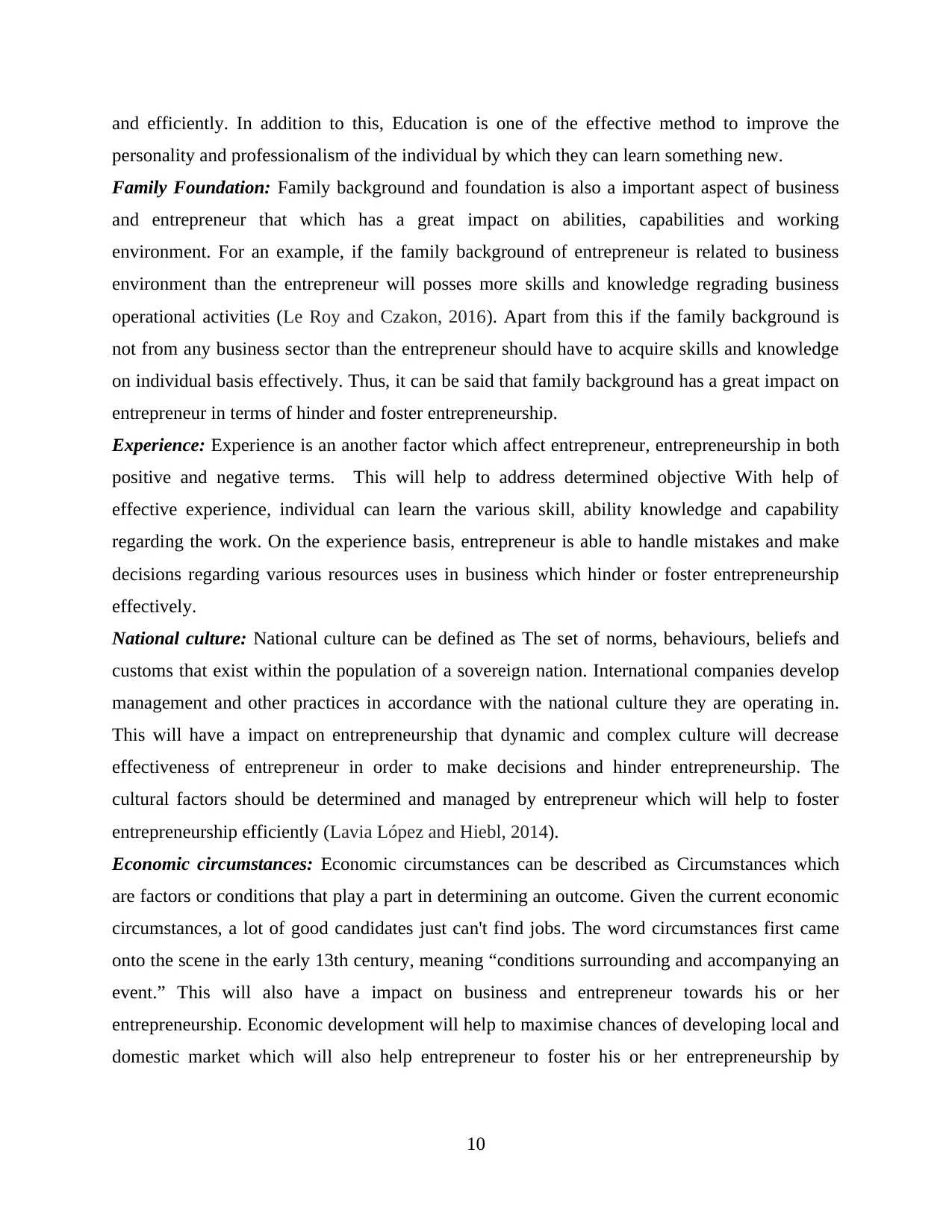
and efficiently. In addition to this, Education is one of the effective method to improve the
personality and professionalism of the individual by which they can learn something new.
Family Foundation: Family background and foundation is also a important aspect of business
and entrepreneur that which has a great impact on abilities, capabilities and working
environment. For an example, if the family background of entrepreneur is related to business
environment than the entrepreneur will posses more skills and knowledge regrading business
operational activities (Le Roy and Czakon, 2016). Apart from this if the family background is
not from any business sector than the entrepreneur should have to acquire skills and knowledge
on individual basis effectively. Thus, it can be said that family background has a great impact on
entrepreneur in terms of hinder and foster entrepreneurship.
Experience: Experience is an another factor which affect entrepreneur, entrepreneurship in both
positive and negative terms. This will help to address determined objective With help of
effective experience, individual can learn the various skill, ability knowledge and capability
regarding the work. On the experience basis, entrepreneur is able to handle mistakes and make
decisions regarding various resources uses in business which hinder or foster entrepreneurship
effectively.
National culture: National culture can be defined as The set of norms, behaviours, beliefs and
customs that exist within the population of a sovereign nation. International companies develop
management and other practices in accordance with the national culture they are operating in.
This will have a impact on entrepreneurship that dynamic and complex culture will decrease
effectiveness of entrepreneur in order to make decisions and hinder entrepreneurship. The
cultural factors should be determined and managed by entrepreneur which will help to foster
entrepreneurship efficiently (Lavia López and Hiebl, 2014).
Economic circumstances: Economic circumstances can be described as Circumstances which
are factors or conditions that play a part in determining an outcome. Given the current economic
circumstances, a lot of good candidates just can't find jobs. The word circumstances first came
onto the scene in the early 13th century, meaning “conditions surrounding and accompanying an
event.” This will also have a impact on business and entrepreneur towards his or her
entrepreneurship. Economic development will help to maximise chances of developing local and
domestic market which will also help entrepreneur to foster his or her entrepreneurship by
10
personality and professionalism of the individual by which they can learn something new.
Family Foundation: Family background and foundation is also a important aspect of business
and entrepreneur that which has a great impact on abilities, capabilities and working
environment. For an example, if the family background of entrepreneur is related to business
environment than the entrepreneur will posses more skills and knowledge regrading business
operational activities (Le Roy and Czakon, 2016). Apart from this if the family background is
not from any business sector than the entrepreneur should have to acquire skills and knowledge
on individual basis effectively. Thus, it can be said that family background has a great impact on
entrepreneur in terms of hinder and foster entrepreneurship.
Experience: Experience is an another factor which affect entrepreneur, entrepreneurship in both
positive and negative terms. This will help to address determined objective With help of
effective experience, individual can learn the various skill, ability knowledge and capability
regarding the work. On the experience basis, entrepreneur is able to handle mistakes and make
decisions regarding various resources uses in business which hinder or foster entrepreneurship
effectively.
National culture: National culture can be defined as The set of norms, behaviours, beliefs and
customs that exist within the population of a sovereign nation. International companies develop
management and other practices in accordance with the national culture they are operating in.
This will have a impact on entrepreneurship that dynamic and complex culture will decrease
effectiveness of entrepreneur in order to make decisions and hinder entrepreneurship. The
cultural factors should be determined and managed by entrepreneur which will help to foster
entrepreneurship efficiently (Lavia López and Hiebl, 2014).
Economic circumstances: Economic circumstances can be described as Circumstances which
are factors or conditions that play a part in determining an outcome. Given the current economic
circumstances, a lot of good candidates just can't find jobs. The word circumstances first came
onto the scene in the early 13th century, meaning “conditions surrounding and accompanying an
event.” This will also have a impact on business and entrepreneur towards his or her
entrepreneurship. Economic development will help to maximise chances of developing local and
domestic market which will also help entrepreneur to foster his or her entrepreneurship by
10
⊘ This is a preview!⊘
Do you want full access?
Subscribe today to unlock all pages.

Trusted by 1+ million students worldwide
1 out of 15
Related Documents
Your All-in-One AI-Powered Toolkit for Academic Success.
+13062052269
info@desklib.com
Available 24*7 on WhatsApp / Email
![[object Object]](/_next/static/media/star-bottom.7253800d.svg)
Unlock your academic potential
Copyright © 2020–2026 A2Z Services. All Rights Reserved. Developed and managed by ZUCOL.




